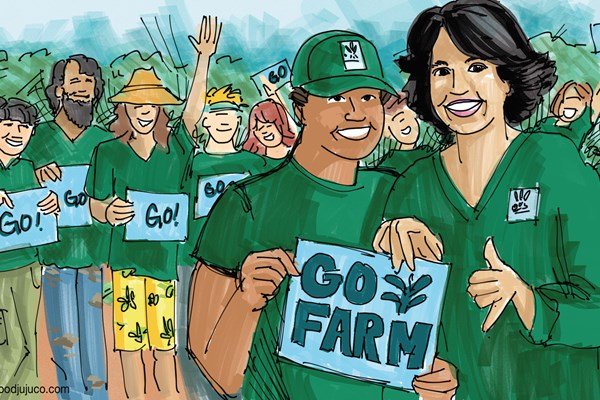UH extension program plants the seeds for new farmers
Aug 27, 2020

Our talk story series continues with farmers, ranchers, and stakeholders in the local agriculture industry to explore the crucial role of ag producers in sustaining our communities during the COVID-19 pandemic.
GoFarm Hawaii offers business services and training to ag industry professionals
A conversation with
Janel Yamamoto, Director of GoFarm Hawaii
By Dani Douglass
Housed within the College of Tropical Agriculture and Human Resources (CTAHR) at the University of Hawaii is a program called GoFarm Hawaii, which has provided support to farmers and future agricultural industry professionals since 2003. Although its administrative offices sit in Manoa, GoFarm Hawaii has training sites throughout the state, including locations on Oahu, Maui, Kauai and Hawaii Island.
The organization’s director, Janel Yamamoto, wants farmers, ranchers and anyone who aspires to work in the industry to know there are resources available to support them through today’s uncertain times. New farmers in particular are vital to sustaining the future of agriculture in the Islands, which is important to the state’s resilience and food security. GoFarm Hawaii’s Beginning Farmer Training Program is tailored to get growers started in the business.
“New beginning farmers are critical for our state,” Yamamoto said. “So, if people know of anyone who wants to enter the field and would be a good fit as a trainee, encourage them.”
The Beginning Farmer program has been going strong since 2012, offering a low-cost option that works around a traditional work schedule. The curriculum is time intensive and consists of several months of classroom and hands-on training at one of the sites across the state. When students step onto their assigned plot of land, they sow the concepts they’ve learned in the classroom.
“Students do everything from conditioning the soil, seeding and weeding, to marketing,” Yamamoto said. “They learn about commercial concepts, crop rotations and production planning. They need to plan when to plant their products to be consistent and reliable. On the business side, students learn about how much it costs to grow crops, network with others in the industry, and learn about loans and grants to help them along the way.”
Once a student graduates from training, most locations have land available for them to start their business. It’s a low-risk opportunity because infrastructure and equipment are shared, while the farmer builds capital and a customer base before going out on their own. A pilot program is also underway where graduates work for a business that is modeling agricultural practices and techniques most similar to what they’d like to undertake.
Through the COVID-19 pandemic, the Beginning Farmer program has made a few operational shifts, mainly involving class size and moving in-person classroom sessions to an online platform. On the curriculum side, students are normally required to produce and sell a product to earn a designated amount of income. Due to social distancing and limited sales opportunities, students have been including their products in community supported agriculture (CSA) distributions and donating food to those in need within their communities. Farmers on GoFarm Hawaii land have also made tweaks to their daily operations.
“We’ve had a bunch of farmers pivot to meet the market demands,” Yamamoto explained. “Prior to COVID-19, they may have been selling to restaurants, smaller grocers, and farmers’ markets. Many initially shifted to on-farm pickup and a CSA model. As buyers get more comfortable with going back to the store, they are shifting again to meet market demand.”
In addition, GoFarm Hawaii has services for those already working in the agricultural industry, all of whom can use its consulting services that are mostly free of charge. Specific areas include business plan production, marketing support, and financial analysis. GoFarm Hawaii also collaborates with partner organizations statewide on other key business components such as grant writing.
The organization offers educational opportunities throughout the state on business topics, recently hosting a Hawaii Argi-Tourism Webinar Summer Series. It also provides services in the community, such as a program at the Waiawa Correctional Facility and a collaboration on Hawaii Island to support veterans who wish to start farming.
Yamamoto attests that kamaaina have played an important role in supporting the industry through the pandemic and that farmers need continued support in order to survive.
“Supporting local does matter, and I feel that people recognized this when COVID started,” she said. “People were looking to connect directly with local farmers and were reaching out for help to do that.
“We encourage people to use the ‘find a farmer’ tool on our website. Supporting our local farmers and ranchers is important and does make a difference. We need to continue the support beyond this period and remember that this is what is going to help our local farmers and economy.”
Follow GoFarm Hawaii on Instagram @gofarmhawaii.
Categories
- Clean Transportation (114)
- Renewable Energy (75)
- Agriculture Story Series (20)
- Local Food (127)
- News Releases (19)
- Promotions and New Hires (4)
- Less Waste (8)
- Freshwater (22)
- Our Ohana (15)
- In the News (5)
- careers (1)
- Blog (1)
- clean energy (2)
- PUC (2)
- Ulupono Video Podcast Series Talk Story Room (1)
- Bills (1)
- Legislature (1)
- DA BUX (1)
- Electric Vehicle (1)
- Agriculture (3)
- policy (2)

